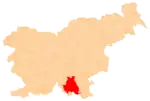Konca Vas
Konca Vas (pronounced [ˈkoːntsa ˈʋaːs]; Slovene: Konca vas, formerly Konca[2] or Konec;[3] German: Ort[2][4]) is a small settlement immediately north of Stara Cerkev in the Municipality of Kočevje in southern Slovenia. The area is part of the traditional region of Lower Carniola and is now included in the Southeast Slovenia Statistical Region.[5]
Konca Vas
Konec (until 1952) | |
|---|---|
 Konca Vas Location in Slovenia | |
| Coordinates: 45°40′19.22″N 14°50′40.84″E | |
| Country | |
| Traditional region | Lower Carniola |
| Statistical region | Southeast Slovenia |
| Municipality | Kočevje |
| Area | |
| • Total | 0.4 km2 (0.2 sq mi) |
| Elevation | 484.8 m (1,590.6 ft) |
| Population (2002) | |
| • Total | 112 |
| [1] | |
Geography
Konca Vas is a compact village on a low rise. The soil is loamy and fertile. The settlement is surrounded by fields used to grow wheat and barley.[6]
Name
The Slovene name of the settlement is derived from the Slovene common noun konec 'upper end of a valley',[7] referring to the village's location as the hills narrow near it. The name of the settlement was officially changed from Konec to Konca vas in 1952.[3][6] However, the name Konca vas was already in use much earlier.[8] The German name Ort has the same semantic motivation; the word now simply means 'place, location' but originally referred to an 'outer end' or 'point'.[9]
History
The land registry of 1574 recorded four full farms divided into eight half-farms in Konca Vas.[6] The original Gottschee German population of the village was evicted in the fall of 1941, after which the village stood empty.[6] House no. 13 in the village has a plaque stating that Jože Šeško, an agitator for the Liberation Front, was captured there on April 28, 1942 (he was shot in Ljubljana on May 11, 1942).[6] Konca Vas was resettled after the Second World War by Slovenes from various areas.[6]
Notable people
Notable people that were born or lived in Konca Vas include:
- Georg Jonke (1777–1864), beekeeper[6][10]
References
- Statistical Office of the Republic of Slovenia Archived November 18, 2008, at the Wayback Machine
- Leksikon občin kraljestev in dežel zastopanih v državnem zboru, vol. 6: Kranjsko. 1906. Vienna: C. Kr. Dvorna in Državna Tiskarna, p. 42.
- Spremembe naselij 1948–95. 1996. Database. Ljubljana: Geografski inštitut ZRC SAZU, DZS.
- Ferenc, Mitja. 2007. Nekdanji nemški jezikovni otok na kočevskem. Kočevje: Pokrajinski muzej, p. 4.
- Kočevje municipal site Archived April 2, 2010, at the Wayback Machine
- Savnik, Roman, ed. 1971. Krajevni leksikon Slovenije, vol. 2. Ljubljana: Državna založba Slovenije, p. 228.
- Snoj, Marko. 2009. Etimološki slovar slovenskih zemljepisnih imen. Ljubljana: Modrijan and Založba ZRC, p. 198.
- Intelligenzblatt zur Laibacher Zeitung, no. 141. 24 November 1849, p. 26.
- Seebold, Elmar. 1999. Kluge Etymologisches Wörterbuch der deutschen Sprache, 23rd edition. Berlin: Walter de Gruyter, p. 604.
- Bokal, Ljudmila, ed. 2008. Čebelarski terminološki slovar. Ljubljana: Založba ZRC, ZRC SAZU and Lukovica: Čebelarska zveza Slovenije, p. 254.
External links
 Media related to Konca Vas at Wikimedia Commons
Media related to Konca Vas at Wikimedia Commons- Konca Vas on Geopedia
- Pre–World War II map of Konca Vas with oeconyms and family names
